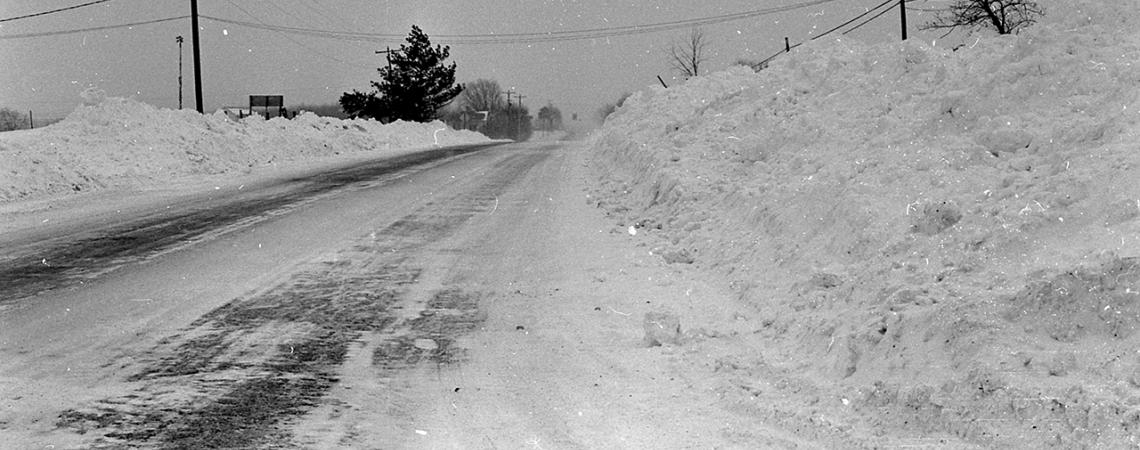The combination of snowplows and gusting wind built up piles of snow as high as 15 feet high in some areas of Ohio during the record-setting Blizzard of 1978, 40 years ago this month. Many roads were impassable for days afterward, while residents had to move into shelters because of widespread power and water outages. (Photo courtesy of the Delaware County Historical Society)
For most Ohioans, the first sign that something unusual was happening on that night 40 years ago was the shriek of a fierce, unrelenting wind.
In the late evening of Jan. 25, 1978, a low-pressure system from Canada met another low-pressure system from Texas. Such storms approach from opposite directions several times each winter, according to the National Weather Service. Usually they miss each other. This time they collided, causing what has come to be widely known as “the storm of the century.”
Immediate and devastating
Six Midwest states were clobbered with high winds, heavy snow, and wind chills of at least 50 degrees below zero. Gusts of 69 mph were recorded in Dayton and Columbus; Cleveland noted a gust of 82 mph. Four states, including Ohio, activated the National Guard.
Thousands of electric customers lost power. According to the Jan. 27 Delaware (Ohio) Gazette, a spokesman for Delaware’s Rural Electric Cooperative (now Consolidated Electric Cooperative) said most of the outages were from “wires being blown together and then short-circuiting.” Falling poles, downed lines, and fallen trees added to the problems.
Rural Electric crews “fought the cold and winds through the night to restore electricity,” the Jan. 27 Gazette reported. Then-manager L.D. Ziegler told the newspaper that linemen were having difficulty getting to problem areas: “Everywhere we go, we have to have a grader in front of us,” he said.
Widespread hardship
Across Ohio, thousands of motorists were stranded in snowbound cars; 22 people in Ohio died after they walked away from their immobilized vehicles. The Ohio Turnpike closed for the only time in its history. Thousands more were evacuated from homes without heat or electricity. They found shelter in churches, schools, and armories.
The Guard’s adjutant general at that time, James C. Clem, reported drifts were 15 feet high and 100 yards long in Clermont County. On the Ohio River near Cincinnati, an ice jam 20 feet thick and 2½ miles long shoved 17 barges and towboats against Markland Dam.
Grateful for help
The Ohio National Guard magazine, The Buckeye Guard, devoted its April 1978 issue to the blizzard. It included a letter of thanks from Ohio Rural Electric Cooperatives, the statewide association that serves electric co-ops in the state:
“Without the help of the helicopter furnished to us, it would have been several days longer before we were able to return service to many thousands of rural electric consumers in Ohio. We would like to commend the pilots and other personnel who worked long and hard helping us with this effort,” the letter said.
Alternate transportation
Emerson Snapp, who was a Logan County Electric Cooperative trustee and a volunteer firefighter in 1978, said he was called to a house fire at 6 a.m. Jan. 26.
His wife told him to forget it. “‘It’s been snowing and blowing for hours,’” he recalls her saying. But Snapp thought his four-wheel-drive truck could make it.
It couldn’t. The Snapps’ house was in a woods, and when Snapp drove beyond the wooded area, the wind and snow were blinding. He backed up, left the truck, and climbed on his snowmobile.
Fortunately, the resident with the fire called back to say she’d put it out herself. Snapp, who recently retired as trustee, spent the next five days delivering food, fuel, and heating oil to people in need.
Clearing the way
Meanwhile, the Logan County Electric Cooperative coped with power outages by synchronizing its crews with those of the county garage across the road. “When the snowplows went out, our guys went out behind the snowplows,” Snapp says.
On Monday, five days after the blizzard began, the no-travel order was lifted. However, then-Delaware County Sheriff William Lavery warned, “Things are not back to normal by any means.”
“Normal” did return, eventually. But the winter of 1977-78 still holds many records: greatest snow depth, lowest barometric pressure, greatest snowfall in a 24-hour period, the state’s most severe storm for any season, the most snowfall during January, and the snowiest winter.
And very possibly, the most stories told.









